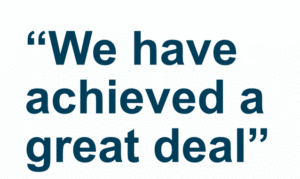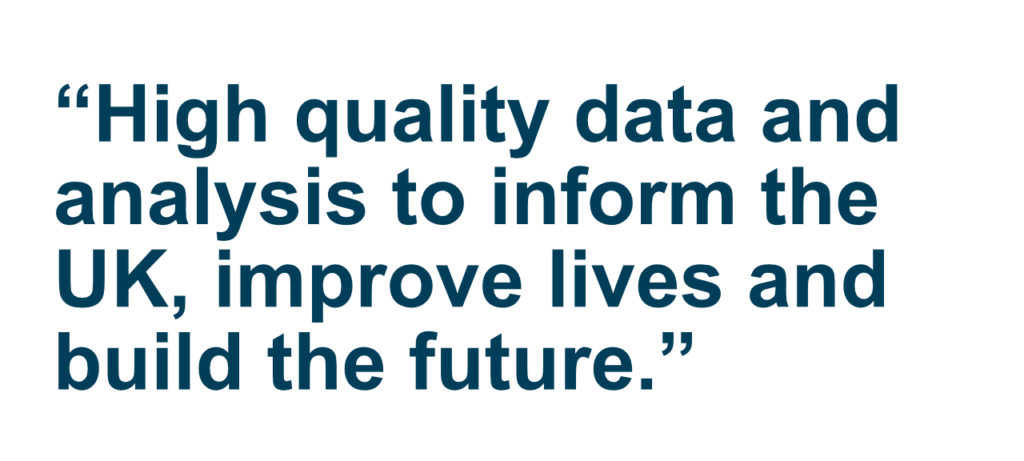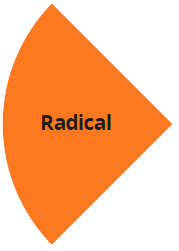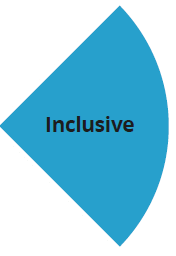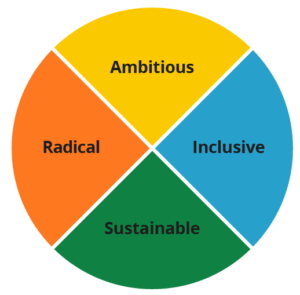Informing the UK. Improving lives. Building the future.
The UK Statistics Authority has launched its new five-year strategy: Statistics for the Public Good. The previous strategy: Better Statistics, Better Decisions ran from 2015-2020.
As part of the planning and preparation for this new strategy the Authority has engaged with a wide range of users and stakeholders, read what some of them had to say about our new strategy.
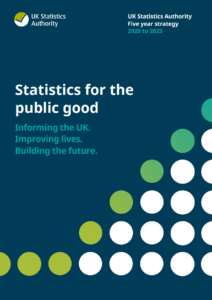 Download the strategy as a PDF (1.125MB)
Download the strategy as a PDF (1.125MB)
Jump to…
Foreword from the Chair
The UK Statistical System
Who we are
Where we are now
Mission
Core Principles
Where the statistical system will be in five years
Delivering the strategy
Foreword from the Chair
I write this in July 2020 as the UK is coming out of lockdown. I am hugely proud of the work done by those working in the statistical system. They have responded with commitment, imagination, flexibility and speed. There will no doubt be things we could have done better and lessons to learn. But our statisticians have shown the vital importance of good, relevant statistics and the strength of our statistical system, its people, its institutions and its legislative framework.
Their achievement would also not have been possible without the changes laid out in ‘Better Statistics, Better Decisions’, our five-year strategy which came to its end in March. The publications today set out our strategy for the next five years. As we move into this next phase the striking thing is how much our response to the pandemic has been an acceleration of changes that were already in train and themes of the new strategy. I think in particular the greater use of administrative data, the sharing of data across government and from the private sector, and the deeper collaboration with universities and a myriad of other organisations.
All that is immensely encouraging, and exciting. Changes that might have taken years have taken weeks, surveys that may have taken months to design have taken days, and I hope that all can now see the huge potential to understand our society and economy better, and how much benefit can come from that. One example – an important one – lies in joined up government. Successive governments have wanted it and often failed. But you can’t have joined up government without joined up statistics. Now we can deliver them.
Much to be done, but I’m confident that with the people in the ONS, OSR and the GSS, and with the right support, our statisticians can make an even bigger contribution to a United Kingdom that makes better choices at every level, as individuals, as Government and as a country.
Sir David Norgrove
July 2020
The UK Statistics System
The UK Statistics Authority is an independent body at arm’s length from government, which reports directly to the UK Parliament, the Scottish Parliament, the Welsh Parliament and the Northern Ireland Assembly. The Statistics and Registration Service Act 2007 (SRSA) established the Authority with the statutory objective of “promoting and safeguarding the production and publication of official statistics that serve the public good”. The public good includes
- informing the public about social and economic matters;
- assisting in the development and evaluation of public policy; and
- regulating quality and publicly challenging the misuse of statistics.
This is our strategy for the statistical system. It describes the vision for the next five years. As the economy and society change rapidly, we will change too. We cannot say exactly what statistics the system will produce in five years’ time. Nor can we say precisely how those statistics will be used and consumed. But we do expect the work of the statistical system to be more relevant, quicker, trusted and frequently produced in partnership enabling more detailed analysis at finer more flexible geographies.
The next five years present a radical opportunity for the statistical system. Ever more data, legislative changes, opportunities for partnership and new capabilities have changed society and the economy. The system will need clear plans to grasp this opportunity.
The possibility for deliberate and accidental misuse of statistics will likely continue to grow, increasing the need for strong regulation.
Above all the system will be more joined up, serving the needs of all four nations, and providing a service which enhances clarity and coherence to make it easier to answer people’s questions and harder for anyone to misuse evidence.
This document sets out the overall context. Separate operational plans from the ONS, OSR and GSS set out how we will achieve this strategy in greater detail.
Who we are
This strategy covers the principal elements of the UK official statistics system for which the Authority has oversight. The Authority provides professional oversight of the Government Statistical Service (GSS), and has exclusive responsibility for its two executive arms, the Office for National Statistics (ONS) and the Office for Statistics Regulation (OSR).
The Office for National Statistics
The ONS is the Authority’s statistical production function and is part of the GSS. Led by the National Statistician, the ONS is the UK’s internationally recognised National Statistical Institute and largest producer of official statistics. The ONS produces data, statistics and analysis on a range of key economic, social and demographic topics.
Office for Statistics Regulation
The OSR is the Authority’s independent statutory regulator. Led by the Director General for Regulation, OSR ensures that statistics are produced and disseminated in the public good and aims to increase public confidence in the trustworthiness, quality and value of statistics produced by governments. OSR also reports publicly on system-wide issues and on the way statistics are being used, celebrating when the standards are upheld and challenging publicly when they are not.
The Government Statistical Service
The GSS is a UK network, spread across a whole range of public bodies, including the devolved administrations and UK government departments which produces and analyses statistics. It includes professional statisticians, data scientists, geographers, researchers, economists, analysts, operational delivery staff, IT specialists and other supporting roles. The GSS is also a part of the cross-government Analysis Function, which has built a community of analysts of various professional backgrounds working to provide the evidence base for understanding the biggest challenges of the day. Both the Analysis Function and the GSS are also led by the National Statistician.
Where we are now
Our previous strategy, ‘Better Statistics, Better Decisions’ came to an end earlier this year, having set out our course for the past five years. There we described a plan to change the statistical system to help people and institutions make their decisions in a way that would be better informed. It recognised the need for a more outward looking, responsive and thoughtful statistical system. This view was reinforced by parliamentary Select Committee reports and the Independent Review of Economic Statistics (2016). These reports have also highlighted the need for greater clarity and power around regulation.
ONS and GSS Achievements
We have delivered a new range of statistics to decision-makers in priority areas including productivity, prices, flow of funds, migration between EU and UK, fraud and cybercrime, and homelessness. The timeliness and granularity of key existing measures – trade, monthly gross domestic product – have improved along with strengthening of weaker statistics such as consumer prices and construction. We have also begun to fill evidence gaps in areas such as regional/sub-national statistics, the service and financial sectors, homelessness, crime, migration and students, tourism and health.
We have removed pre-release access for Ministers and officials to ONS statistics in order to increase public confidence.
We have greatly improved our technology, including the technology for our field force, giving us much greater capability. A modern, secure, and user focussed survey and technology estate is essential to the delivery of the best quality services across the system. This has also enabled us to make preparations for the Census in 2021, including running a successful rehearsal in 2019.
The establishment of the National Statistician’s Data Ethics Advisory Committee, the Data Science Campus, and the Economic Statistics Centre of Excellence have all increased the statistical system’s ability to be proactive and to react more quickly to issues of the day; and we have established the Research Accreditation Panel to support better access to data for research across the UK using the Digital Economy Act’s research framework. The Independent Review of Economic Statistics (2016) led to improvements in our core economic statistics.
OSR Achievements
Five years ago, the Office for Statistics Regulation was known simply as the monitoring and assessment team. This title did not adequately describe the role this group played and should play in public life. The introduction of the OSR as a clearly delineated body aimed to give a better balance to the statistical system, and experience since its creation has shown its value.
A redeveloped Code of Practice for statistics, including the ability for organisations to voluntarily adopt its principles, has enhanced OSR’s influence and authority.
OSR has also published a number of systemic reviews, notably into joining up data, and adult social care. These reviews improve the value provided by statistics, enhance coherence, and highlight important data gaps where they exist.
These steps have built a platform from which OSR interventions, when they are required, can have greater impact.
The next stage
The period of the Better Statistics, Better Decisions strategy ended in March 2020, just as the COVID-19 pandemic changed the way of life in the UK. Statistics, like so much else, have been profoundly affected.
To meet the need for data at a time of national emergency, radically different ways of working were adopted. A major national COVID-19 prevalence study was designed and launched in a matter of days. New, high-frequency online surveys and data science sources provided real-time information about people and businesses as the epidemic progressed. Alternative methodologies to measure a changed economy were conceived and implemented.
Understanding grew of the need for accelerated data sharing within governments and outside it, and there has been welcome collaboration right across Whitehall, the Devolved Administrations, universities, and with the private sector.
History suggests that events like this can accelerate what was happening anyway. The challenge now is to keep the sense of collaboration and to build on it.
The need and the demand are certainly there. Data from the ONS and across the GSS have never been in more demand or achieved such public prominence and scrutiny. Better data directly informs governments, Parliaments and society. Faster, more relevant data support critical decisions day after day.
The statistical system’s response to the pandemic has shown its strengths. The aim of this strategy is to keep up the momentum, to make greater data sharing and innovation and a much wider reach of our information across society permanent features of our statistical system.
This will be achieved through a focus on building and retaining a culture of delivery, built on the Civil Service Values. We will champion an inclusive and welcoming culture and an empathetic and kind management style, with equality of esteem and opportunity and relationships built on trust and flexibility, the right learning opportunities and a desire for change.
The changing context
The context is changing but also much remains the same. There is a continued demand for evidence to inform policy, service delivery and democratic debate that is felt right across the Government Statistical Service. There is still a need for ever more local, frequent, up to date, accessible, relevant and coherent information to help individuals, businesses and civil society.
But other things have changed markedly. The opportunity to link multiple sources of data to come to the best answer has been greatly enhanced through new legislation and technology. Many of the issues facing us today cross departmental and geographical boundaries and the responses to them are organised in a collaborative way. From the pandemic and its economic aftershock to climate change, inequality, mental health and social care – these all require cross cutting analysis. Joined up government will not happen without joined up data. It is essential that the GSS works to join data up wherever possible embracing the emerging Analysis Function and UK’s broader scientific and research community.
At the same time the risk of losing trust through misuse or misunderstanding of official statistics and evidence has never been greater. We must not be afraid to call out publicly where evidence and data are used unscrupulously, or where the integrity of official evidence is undermined. This presents a challenge to regulation as well as an opportunity in production.
Mission
Evidence produced free from political and commercial influence is a cornerstone of democratic society. It allows for the better formulation and evaluation of public policy; it informs public understanding of the world and our place in it; it informs decision makers to take choices and lets others hold the powerful to account.
The Authority is uniquely placed for its role in this through:
- a statutory remit enshrined in the Statistics and Registration Service Act to independently produce and safeguard national statistics, support the design of policy and produce analysis for the public good.
- guiding principles of trustworthiness, quality and value enshrined in the statutory Code of Practice for Statistics overseen by the OSR.
- the ability to bring together all those involved in producing statistics that serve society by convening cross government analytical capability and research interests through the breadth and talent of the GSS, the Government Analysis Function and the broader scientific and research community in the public and private sectors.
- access to data under the Digital Economy Act, which supports our access to new sources of data, safely and securely, to produce the analysis our decision-makers need.
- the capacity to innovate, develop new data science techniques and respond in real-time to the nation’s needs through the Data Science Campus; and
- the practical application of data ethics, through the National Statistician’s Data Ethics Committee and the exercise of impartiality, transparency and openness in all we do to retain the trust of society.
The mission of the UK statistical system is:
Core Principles
These are the core principles which will underpin the work of the statistical system over the next five years.
We will be…
 Ambitious in setting out to answer the critical research questions the public needs Governments to answer, and informing the decisions that citizens, businesses and civil society take.
Ambitious in setting out to answer the critical research questions the public needs Governments to answer, and informing the decisions that citizens, businesses and civil society take.
This means anticipating the data, insights and understanding the UK needs, being boldly innovative with our methods and sources, and responding rapidly and transparently to reach the widest audience that we can.
 Sustainable in delivering a unique service in a way which delivers value for money through partnership and collaboration.
Sustainable in delivering a unique service in a way which delivers value for money through partnership and collaboration.
This means supporting and stewarding the UK’s statistical infrastructure, and collaborating with the expertise of the UK’s scientific community, academia, and the commercial sector, learning from each other.
To achieve this, analysts working in the system need to develop their role as communicators. Professional commentary and advice on contemporary issues is what the system is for. Statisticians and analysts should be confident in their ability to provide that impartial view of the world.
To maximise impact this will mean working in partnership even more than the system does now.
- Respond flexibly to the uncertainties and challenges of COVID-19 and realise long term value from the COVID-19 Infection Survey.
- Provide an inclusive, trusted and engaging narrative on the UK’s economic and social fabric and trends, addressing cross-cutting issues and providing analysis to inform and engage governments, policy makers and the wider public.
- Build flexible and integrated analytical capabilities and data management tools to address COVID-19 and other priorities to enable the organisation to manage data and deliver analysis that cuts across organisational boundaries.
- Deliver high quality, inclusive and efficient economic and social statistics that are internationally recognised, by streamlining our processes and blending administrative data with transformed survey capabilities with the capacity to answer key questions quickly.
- Deliver a successful Census in March 2021, deliver high-quality outputs from the Census in 2022 and make a robust recommendation on the future of the Census in 2023.
- Deliver a revised and comprehensive system of population and migration statistics based on administrative data and a consolidated social survey platform, having successfully delivered the full benefits of Census 2021.
- Take opportunities to advocate for improved statistical literacy – with the analytical community, Parliament, schools, media etc.
Where the statistical system will be in five years
Data in all forms are increasingly central to all our lives. This is creating a big prize for the statistical system, the Civil Service and for the UK. Analysts working across governments are using ever new data sources and techniques to provide insight on the topics which really matter. And the increased risk of distorted reporting of information increases the need for a confident statistical system.
Analysts have to take responsibility for communicating the best evidence well, making it harder for evidence to be misrepresented. This means clarity about findings (and their limitations), great visualisation, real world application of advanced analytics, machine learning and artificial intelligence as well as a strong use of narrative alongside numbers. There will be products and services to better meet the need of both the public as a whole as well as specialist audiences.
When misrepresentation does occur, it needs to be challenged publicly and directly without hesitation.
The basic resource of the statistical system is data. Increasingly that data is coming from administrative sources. This is right. Often citizens and businesses already have data collected about their activity, and the GSS should reuse that rather than collecting it again where that is possible. But it is also important to note the continuing and critical role of social and business surveys to provide insights on topics that cannot be understood through administrative systems alone. There is an important role for the GSS and wider UK research community to harness the power of both administrative data and survey data. This will minimise the burden on citizens and businesses while maximising analytical impact. To ensure our use of data is always for the public good, data ethics will become ever more important and we want to be recognised world-leaders in the practical application of data ethics for statistics and research, with a centre of excellence to deliver this.
Statistics are only useful if they can be used. This means that the publication model for analytical information in the future will be radically different, with more information readily available for research, and publications providing insight in a format that can be readily understood. The system will adapt to provide information in formats which are more useable, drawing together and publishing information in a coherent way.
Professional skills have always been critical within the GSS. Specialist expertise in collecting information, statistical methods, data science, communication, and many more skills in between are vital to a strong statistical system. These professional skills will need better leadership. It is up to the leadership to make the system a brilliant place to work. People working across our community must feel connected to the mission, a clear sense of public purpose, and opportunities for professional development. Our people may work in the office, or at home; on one particular geographical site or none. Whichever, all our working relationships will be built on mutual trust and shared ambition.
In our data-rich society a good level of statistical literacy will help individuals deal with their finances, understand risk or hold the powerful to account. There is an appetite to learn from journalists, parliamentarians, civil servants and many others. Given this appetite to learn, there is scope for every statistician to be a helpful teacher. We should think about the statistical system’s ability to have a wide-ranging impact on informing society with activity beyond statistical production, through partnership where that would increase impact.
Successful collaboration in the modern statistical world must be international too. As the pandemic and environmental issues have vividly demonstrated, users need data that can be understood in the international context, not in national isolation. We will provide global statistical leadership in those fora, and on subjects central to the UK’s interests. We will promote transparency and high standards, and support coherence and comparability across the global statistical community. And we will continue to work with, and learn from, our partners in the developing world to ensure statistics and data are at the heart of the UK’s development policies and agenda, and provide help to those most in need.
In order to achieve our aims, plans for the ONS, OSR, GSS will work in partnership to:
We must demonstrate both competence and impartiality in all that we do. All our activities must build trust in our unique position in the UK and international data landscape.
The Authority will aim to increase the public value of information already collected through combining it with other information and analysis, making it accessible and presenting the results in a comprehensible way.
All that the statistical system does should improve the knowledge base, and the ability of others to use evidence. This must involve a better and richer understanding of user needs, and a strategic shift towards more impactful cross-cutting analysis.
Communicating relevant evidence effectively is as important as the quantity and quality of evidence itself. All our communications will be clear, insightful and support public understanding.
Delivering the strategy
Our strategy is an ambitious call to action. It sets out our aims, priorities, mission and values to make the case for change. It is not a detailed blueprint for everything that needs to be done. The different parts of the statistical system will contribute to delivery of the objectives set out in this document, in different ways. They will develop their own business plans setting how their activities relate to this strategy for the statistical system overall.
We will ensure that all those involved in official statistics understand how they contribute to the collective mission and objectives.
We will provide quarterly reports on progress. We will formally set out progress in our Annual Report to the UK Parliament, the Scottish Parliament, the Welsh Parliament, and the Northern Ireland Assembly, but there will be many other opportunities to do that as the strategy progresses.




